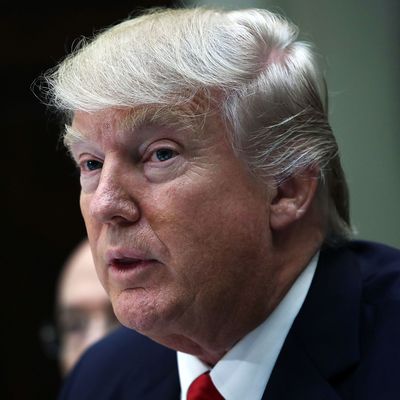
It says a lot about the political system’s (and the news media’s) adjustment to the Trump Era that this tweet from the president of the United States seems like routine news:
Polls aren’t inherently flawed, it seems: just those that are “negative” about Trump’s policies. That is because he is uniquely qualified to understand what the American people want. Why? Well, presumably because he won the presidency despite “fake polls” suggesting he would lose.
It appears Trump is going to keep repeating this chain of convoluted logic until people who look favorably upon him accept it implicitly: He won a big, landslide victory that was disguised by media lies and many millions of fraudulent votes against him; thus he has a mandate to do exactly what he is doing; and what he’s doing is popular, notwithstanding the lies about it from the same lying pollsters and media.
Once you accept the “landslide” premise, it all follows naturally, since Trump’s popular-vote defeat and incredibly narrow path to an electoral vote majority are wished away, and with them the reasonably good record of national polls, which were more accurate in 2016 than in 2012.
Thus, the foundational untruth about the actual results of the 2016 election paves the way to the authoritarian (in the most literal sense of the term) premise that only Trump or Trump-approved sources of information can ever, ever be trusted. And actually, that may understate the claim, since the president constantly asserts that media are deliberately, consciously lying about him. And so: Once you accept his overarching lie, everything that contradicts it must be a malicious untruth. The logic is inexorable.
It is not especially novel for a politician to try to convince her or his supporters to ignore uncongenial information. But typically the maneuver is executed by the recitation of more congenial information, or by changing the subject, not just by arguing that in all things “Daddy knows best.” This tack constitutes the death of all rational political discourse across partisan boundaries: You’re either with the boss or against him, and if you are against him, you cannot take a breath without lying.
Yes, Trump seems to exhibit a vague sense of accountability for mistakes in that he does not always stay on the same course if he is manifestly screwing up. But again: Any type of yardstick for success or failure that depends strictly on an elected official’s self-assessment is worth almost nothing. And that is true even if the elected official in question does not suffer from the personality defect of narcissism.
Right now it is not entirely paranoid to wonder what would convince him to relinquish his office in 2021 if he is not reelected. He is as likely to have evidence that many millions of illegal votes were cast against him as he had in 2016, and as likely to argue that national media — in league, it is now clear, with “activist judges”— have usurped the power of “the American people” to choose a president. If Donald Trump is the only legitimate source of information about public opinion, why even bother with elections? It’s becoming a real question. After all, when Trump kept hinting he might not accept defeat last November, he did not have the vast powers of the presidency at his disposal. Four years from now, he will.






























